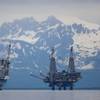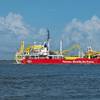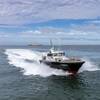It seems that the stricken oil tanker that fouled Charles Darwin's Galapagos island paradise cannot be moved and is set to become an artificial reef, teeming with fish and home to seals and exotic birds, the U.S. Coast Guard said on Sunday.
The Ecuadorean Navy had hoped to clear the semi-submerged "Jessica" from the tiny harbor of San Cristobal island where it ran aground last week, leaking the bulk of its 240,000 gallon fuel cargo into the archipelago's pristine waters. But while the wreck may be an eyesore in the prophetically named "Shipwreck Bay," in time it will become an artificial reef and a new habitat for marine life, Coast Guard salvage chief Ed Stanton said. "Seals will start living on it, birds will begin perching on it. It has already attracted fish," Stanton said. "Over time it will become a terrific place to dive. It's a new habitat. We have a new island in the Galapagos, Isla Jessica."
The Navy was forced to abandon efforts to move the stricken tanker because they did not have the right equipment and the hull was in such poor condition. Stanton forecast that Pacific Ocean waves would erode it out of view within two years.
The spilled oil and chemical dispersants have nearly all been washed out to sea -- there was only a thin sheen of oil around the boat -- so the ecological urgency to move it was gone, he added. The clean-up effort was now focused on capturing sea lions and birds worst affected by the spill in the island cluster 19th century British naturalist Darwin called "enchanted."
Galapagos National Park teams were trawling the coastline with nets and cleaning materials, looking for affected animals. But they were confident the volcanic island cluster's unique ecosystem would suffer no major long-term damage.
Many exotic species including iguanas, flightless cormorants, sea lions and the famous Galapagos giant tortoises -- a mix that inspired Darwin to devise his theory of evolution -- have largely escaped contamination. Just two pelicans were found dead. Forty other pelicans were found soiled and a few sea lion pups, but the search was likely to go on for weeks.
Conservationists from around the world also spotted some giant tortoises and colorful blue-footed boobie birds that will need cleaning at special rehabilitation centers.
Galapagos National Park Director Eliecer Cruz forecast the islands' ecosystem would make a full recovery within three to four years. The ecological damage was minimal because ocean currents took most of the spilled diesel and bunker fuel used to power tour boats away from the islands. The slick also reached the islands of Santa Cruz and Santa Fe, though shoreline impact was minimal.
The animal species have been able to evolve in their natural habitat for thousands of years in isolation some 600 miles (965 km) off the Ecuadorean mainland.
The ship's captain, Tarquino Arevalo, 58, told Reuters he misjudged his entry into the tiny harbor. Now recovered from dehydration after staying aboard the tanker for four days after the accident, Arevalo is due to be moved to the city of Guayaquil on the Ecuadorean mainland on Monday to face charges of damaging the environment -- a crime in the Galapagos. He could face up to five years in jail if convicted.
But local fishermen said government and the Ecuadorean company that owns the tanker should take the blame. "Who is responsible for this? It's not the poor captain. Who gave permission for fuel like that to be transported through here? It's the government and the company that owns the boat who must stand accountable," said one fisherman, Manuel Gordillo. – (Reuters)
Featured videos

Unlock Onboard Data Efficiencies

Tracking Foreign Vessels Working in the U.S. Jones Act Market

Inmarsat Enhances Service to Drive Digitalization
Subscribe for
Maritime Reporter E-News
Maritime Reporter E-News is the maritime industry's largest circulation and most authoritative ENews Service, delivered to your Email five times per week









